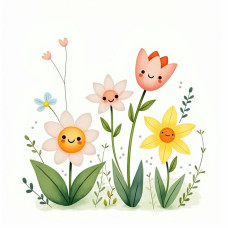
Lesson Overview:
This lesson introduces students to the names of common flowers and explores how we use flowers in different social and cultural contexts. Students will learn flower-related vocabulary and practice using it through interactive tasks and role-play scenarios.
Learning Objectives:
Identify and name a variety of flowers in English.
Talk about preferences and opinions using descriptive language.
Use flower vocabulary in dialogues and real-life contexts.
Discuss cultural practices involving flowers (gifting, celebrations).
Identify and name a variety of flowers in English.
Talk about preferences and opinions using descriptive language.
Use flower vocabulary in dialogues and real-life contexts.
Discuss cultural practices involving flowers (gifting, celebrations).
Students Will Learn:
Vocabulary: tulip, carnation, sunflower, orchid, daffodil, daisy, poppy, marigold, crocus, aster, etc.
Cultural context: what types of bouquets are appropriate for various events.
Expressing opinions and preferences using “would you rather” format.
Vocabulary: tulip, carnation, sunflower, orchid, daffodil, daisy, poppy, marigold, crocus, aster, etc.
Cultural context: what types of bouquets are appropriate for various events.
Expressing opinions and preferences using “would you rather” format.
Students Will Develop:
Speaking: Expressing preferences, giving reasons, dialogue practice.
Listening: Following a conversation and identifying key details.
Reading: Matching tasks and cultural information.
Creative Thinking: Designing their own bouquet (via Genially).
Speaking: Expressing preferences, giving reasons, dialogue practice.
Listening: Following a conversation and identifying key details.
Reading: Matching tasks and cultural information.
Creative Thinking: Designing their own bouquet (via Genially).
April 14, 2025




